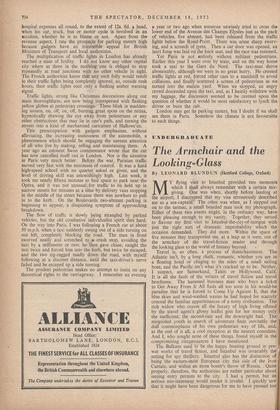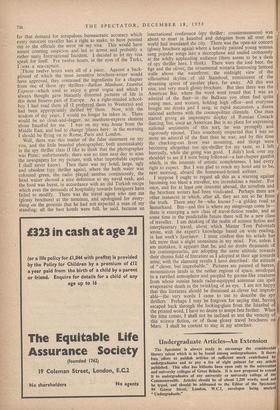UNDERGRADUATE
The Armchair and the Looking-Glass
By LEONARD BLUNDUN (Hertford College, Oxford) Y flying visit to Istanbul provided two moments which I shall always remember with a certain mis- giving. One was when, shortly before landing at the airport, I discovered that my visa erroneously described me as a sea-captain. The other was when, as I stepped out on to the tarmac, a small bearded man took my photograph. Either of these two events might, in the ordinary way, have been pleasing enough to my vanity. Together, they served to flavour my first visit to Istanbul-the-city-of-intrigue with just the right sort of dramatic improbability which the occasion demanded, They did more. Within the space of five minutes they transported me, at a leap as it were, out of the armchair of the travel-fiction reader and through the looking glass to the world of, fantasy beyond. .
Travel is, so often, a process of disenchantment. The Atlantic isn't, by a long chalk, romantic, whether you are in a floating hotel or clinging to the sides of a small sailing boat; and the Pacific isn't what it's cracked up to be. Neither, I suspect, are Samarkand, Tahiti or Hollywood, Calif. It is all the fault of the writers of travel fiction and travel brochures. The harassed business man who buys a ticket to Get Away From It All finds all too soon in his would-be paradise that he is forced to Come Up Against It, that the blue skies and wind-washed wastes he had hoped for scarcely conceal the familiar appurtenances of a noisy civilisation. The rich widow who craves all the luxury of high living offered by the travel agent's glossy leaflet gets for her money only the inefficient, the second-rate and the downright bad. The misguided youth in search of adventure finds inevitably the dull commonplaces of his own pedestrian way of life, and, at the end of it all, a cool reception at the nearest consulate. And I, who sought none of these things, found myself in the compromising circumstances I have mentioned. The Balkans used to be the happy hunting ground in pre- war works of travel fiction, and Istanbul was invariably the setting for spy thrillers. Istanbul also has the distinction of being the eastern-most European city this side of the Iron Curtain, and within an atom bomb's throw of Russia. . Quito properly, therefore, the authorities are rather particular about issuing entry permits to the city. I had a permit, but its serious mis-statement would render it invalid. I quickly saw that it might have been dangerous for me to have pressed too far that demand for scrupulous bureaucratic accuracy which every innocent traveller has a right to make, to have pointed out to the officials the error on my visa. This would have meant courting suspicion and led to arrest and probably a rather nasty International Incident. I decided to let my visa speak for itself. For twelve hours, in the eyes of the Turks, I was a sea-captain. Those twelve hours were all of a piece. Against a back- ground of which the most inventive brochure-writer would have approved, they contained the ingredients for a chapter from one of those spy thrillers—Balkan Manhunt, Istanbul Express—which used to enjoy a great vogue and which I always thought gave blatantly distorted pictures of life in this most bizarre- part of Europe. As a right-minded school- boy I had read them all (I preferred them to Westerns) and had been appropriately thrilled by them. Now, with the wisdom of my years. I would no longer be taken in. There would be no cloak-and-dagger, no manhunt-express element about Istanbul for me. I was on my way home from the Middle East, and had to change 'planes here: in the morning I should be flying on to Rome, Paris and London.
Well, there was this matter'of the false statement on my visa, and the little bearded photographer, both unmistakably in the spy thriller class (I like to think that the photographer was Press: unfortunately, there was no time next day to scan the newspapers for my picture, with what improbable caption I shall never know). Then there was my hotel, large, ugly and obsolete (spy thriller again), where the bath water was coloured green, the radio played sambas continuously, the head waiter showed a nice deference to my naval rank, and the food was burnt, in accordance with an old Turkish recipe which even the demands of hospitality towards foreigners have failed to modify. There was the travel agent who met me (glossy brochure) at the terminus, and apologised for every- thing on the grounds that he had not expected a man of my standing; all the best hotels were full, he said, because an international conference (spy thriller: countermeasures) was about to meet in Istanbul and delegates from all over the world had inundated the city. There was the open-air concert (glossy brochure again) where a heavily painted young woman sang popular songs into a microphone and smiled cretinously at the wildly applauding audience (there seems to be a dash of spy thriller here, I think). There were the iced beer, the figs and the olives; the ornamental wistaria festooning latticed walls above the waterfront; the midnight view of the silhouetted skyline of old Stamboul, reminiscent of the dreaming spires of another place, far away. All this was nice, and very much glossy-brochure. But then there was the American Bar, where the word went round that I was an admiral of .the fleet—in the Balkans you often find quite young men, and women, holding high office—and everyone bought me drinks and I sang, in rapid succession, a dozen national anthems with the cosmopolitan clientele. One man started giving an impromptu display of Russian Cossack dancing, but, since an American Bar is no place for expressing national sentiments of this sort, he was promptly and vigorously ejected. Then somebody suspected that I was no more an admiral of the fleet than he was; and by this time the chucking-out fever was mounting, and things were becoming altogether too spy-thriller for my taste, so I left hurriedly, while the going was good. I didn't look over my shoulder to see if were being followed—a last-chapter gambit which, in the interests of artistic completeness, I had every right to expect. But I was glad to reach my hotel and to be, next morning, aboard the homeward-bound airliner.
I suppose I ought to regard all this as a warning against becoming too blase -a traveller, too incredulous a reader. For once, and for at least one innocent abroad, the novelists and the brochure writers had been vindicated. Perhaps there are other instances in which, after all, they are not so far from the truth. ' There may be—who knows ?—a &den road, to Samarkand. But—and this is where my misgivings come in— there is emerging a new class of travel-fiction reader, and at some time in the predictable future there will be a new class of traveller. I am thinking of the realm of science fiction and interplanetary travel, about which Master Tom Pulvertaft wrote, with the expert's knowledge based on wide reading, in last week's Spectator. I must confess that his article has left more than a slight uneasiness in my mind. For, unless I am mistaken, it appears that he, and no doubt thopsands of his contemporaries, are adopting the same attitude towards their chosen field of literature as I adopted at their age towards mine, with the alarming results I have described: the attitude of " clever, but improbable." Pictures are painted of barren, mountainous lands in the nether regions of space, enveloped in a rarefied atmosphere and • peopled by gnome-like creatures from whose outsize heads radar-equipped antennae can spell evaporative death in ..the twinkling of an eye. I am not happy that this literature should be dismissed as.clever but improb- able—the very words I came to use to describe the spy thrillers. Perhaps I may be forgiven for saying that, having escaped back through the looking-glass from the Istanbul of the printed word, I have no desire to tempt fate further. When the time comes, I shall not be inclined to test the veracity of this science fiction, or of those glossy travel brochures on Mars. I shall be content to stay in my armchair.











































 Previous page
Previous page